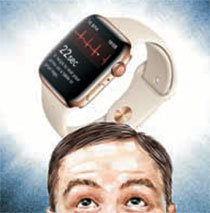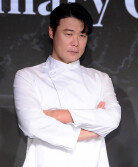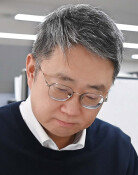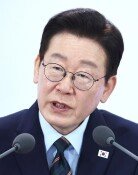Domestic regulations hold back technological innovation
Domestic regulations hold back technological innovation
Posted September. 21, 2018 08:05,
Updated September. 21, 2018 09:01

Apple is releasing its smart watch "Apple Watch Series 4" to the global market this week. The essence is the electrocardiogram checking function. When the user touches the button on the watch, the watch tracks the electric signal of the heart. Around 30 seconds later, the heartbeat is divided into regular rhythm and irregular rhythm. Such information, which is critical in monitoring heart diseases, could be shared with doctors and used in remote medical examinations. Apple explains that its watch has become a precise medical device that acquired the approval by the Food and Drug Administration (FDA) of the United States. As such, some evaluate that Apple is now one step closer to becoming a health care company.
The electrocardiogram checking function, which is boasted by Apple, is a technology that was already developed by a domestic venture entity three years ago. Korean corporations have not yet been able to apply this technology to smart watches due to government regulations. If it were not for layers of regulations, this technology could have been installed on "Galaxy watch" series of the world’s first smart watch developer Samsung Electronics for the first time. What is even more bitter is that due to fastidious regulations for remote medical examination in Korea, you cannot even use the electrocardiogram checking function of Apple Watch Series 4 in Korea.
In the case of Jack Ma, founder of China’s biggest shopping mall Alibaba who recently announced his retirement to focus of charity work for education, he severely criticized the regulations of the Chinese authority at a place where high ranking executives of the Communist Party and government officials were present. Jack Ma’s remarks were made at the keynote speech for the "2018 World Artificial Intelligence Conference (WAIC)" held in Shanghai, China on Monday. “The biggest factor that ruins innovation is the government’s excessive protection over powers that lag behind,” he said. In other words, the Chinese government’s outdated regulations are holding back the future industry.
The situation in China, however, is far better off than Korea. In China, a car sharing service company with a corporate value of up to 60 trillion won emerged and entered the global market. In Korea, the car sharing service is only possible during rush hours. Yet, the Seoul city government even saw this as an illegal business and requested an investigation against the concerned business entity. No business can thrive under these circumstances. Jack Ma’s bitter comments should be considered by Korea’s ruling party or public servants than Chinese officials in terms of sharing economy, which is the key in digital innovation and the health care industries.
Kwang-Hyun Kim kkh@donga.com



![[단독]폴란드, 韓 해군 최초 잠수함 ‘장보고함’ 무상 양도 안받기로](https://dimg.donga.com/c/138/175/90/1/wps/NEWS/IMAGE/2026/02/27/133437397.1.jpg)



